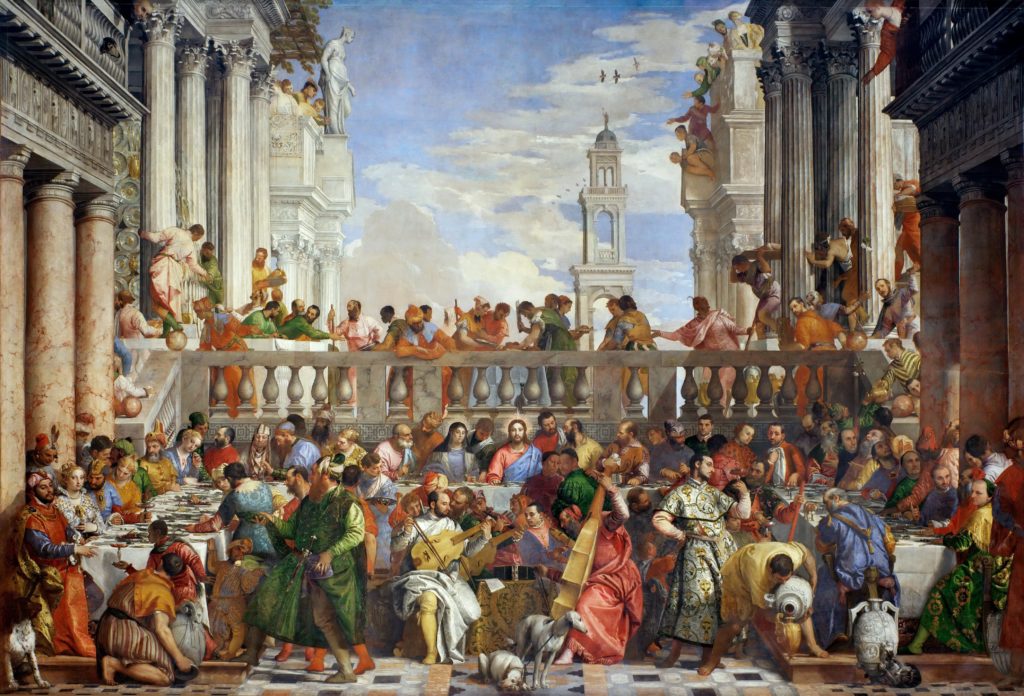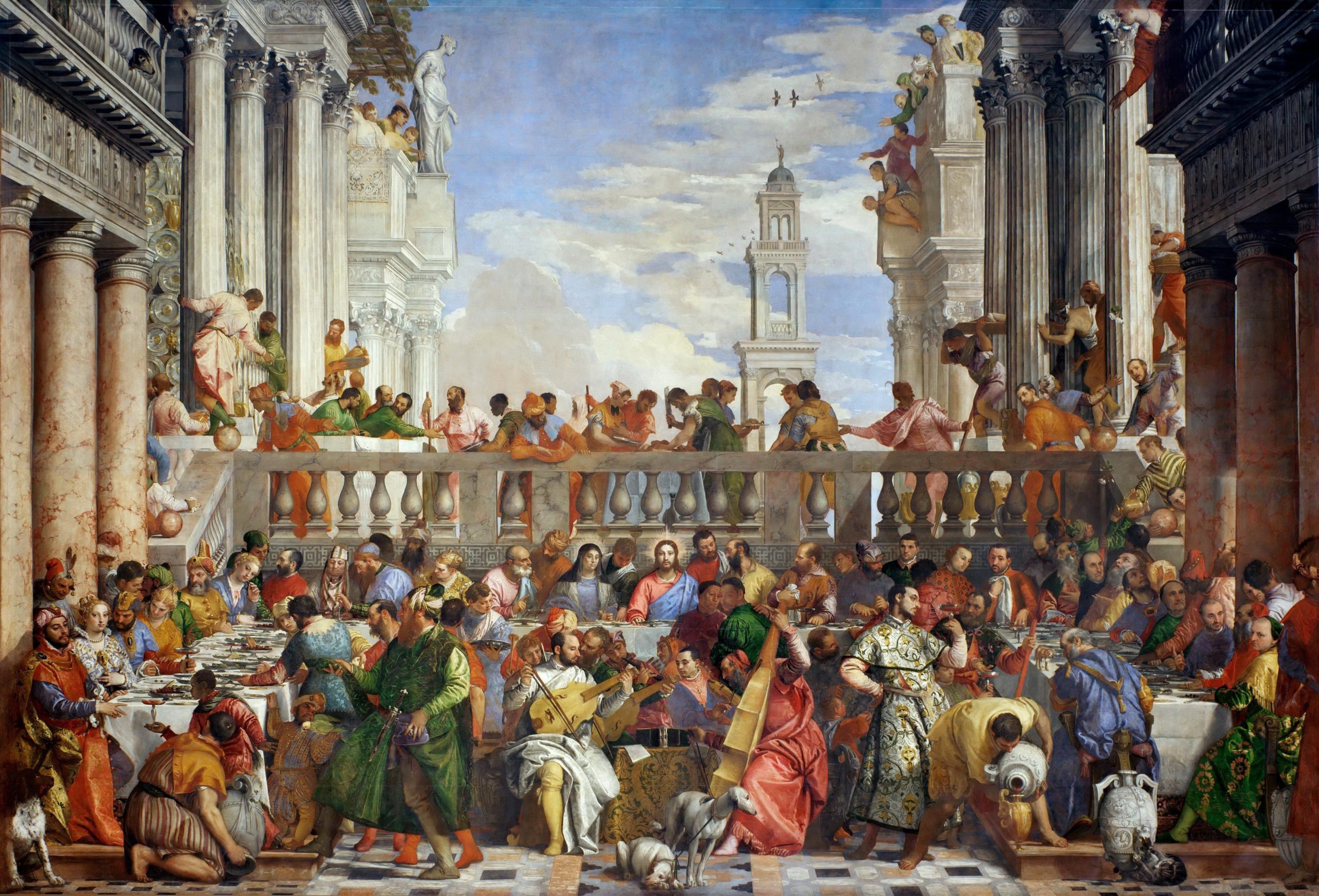by Sonja Corbitt, the Bible Study Evangelista

Studying the Bible, for me, is a lot like cooking a fine dinner for family and friends. You consider the occasion, nutrition, preferences of those you’re serving, amount of labor involved, and ingredients; you balance one proportion of meat to two or more vegetables; and as my mother maintained, “You must always serve something green with every meal.” But the ultimate advantage of being the cook is choosing and preparing what one likes to eat, oneself!
Inherently nourishing myself and those I serve is my usual approach to Bible study. It is altogether a hobby, spiritual gift, and second vocation. I don’t just read and study the Bible for pleasure—I read and study the Bible because it is as necessary as eating. I must. After all, “Man shall not live by bread alone, but by every word that proceeds from the mouth of God” (Matthew 4:4). Indeed, the Catechism tells us that the “one table” of the Lord is both the Eucharist and the Scriptures (CCC 103).
Continental Breakfast
From the Magnificat magazine, Laudate app, or Universalis, I lectio (LOVE the Word®–Listen, Observe, Verbalize, Entrust) with the daily readings every morning for daily guidance, readings set out conveniently by the Holy Spirit through and for the whole Church like a continental breakfast. It sets my spiritual metabolism in motion and is the most important meal of the day.
But my approach to later meals is serious in a different way, extraordinarily flavorful, adventurous, and substantial. And this is why I use Verbum almost exclusively for study.
Second Breakfast, Elevensies, Afternoon Tea, Dinner, Supper
I study because I am researching content for my weekly radio show, podcast, and RCIA classes; preparing talks for a conference, event, or episodes of my CatholicTV show; or writing a book. But I have these outlets to share the nourishment with which I myself have been nourished because I need to study God’s Word as the “solid food” to which St. Paul refers (1 Corinthians 3:2).
Our own need to eat comes first, as it does for everyone, whether or not we ever offer a similar meal to others. Without eating ourselves, we lack the spiritual nourishment required to feed our neighbors. But what we receive from God is so plentiful, it automatically provides for them as well, and it is our duty to provide such hospitality to others. At any given time, I am often studying for all of these reasons at once, so it is important to combine themes and subjects wherever they potentially overlap.
I keep a running list of topics, questions, and areas of interest for future study and frequently schedule series a year ahead to give myself plenty of time to lose myself in the furious disarray of study because just as cooking a fine meal throws one’s kitchen into a wild mess—with spills and splatters, piles of dirty dishes and utensils, and discarded bits and ends of ingredients—preparing a Bible series begins carefully but descends into something of a chaotic jumble before emerging into something measured and consumable. And that’s the fun for me; I often discover fascinating new avenues of possible study while mucking around in the mess for days and days.
Currently, I am offering a Bible study series on the O Antiphons for Advent. For each episode, or meal, I select a word or phrase from the antiphon to study in more depth that carries the whole theme; these are the main course of each meal. Then I click open the Verbum pantry to begin assembling ingredients. I type in a passage reference or key word, and oh! The variety of color, texture, packaging, and aroma that explodes from the shelves of this larder is enough to make me swoon with excitement!
I take a little of everything that captures my attention. For the side dishes, the translation and reference staples. I use eight or so translations the most for comparing passages; three favorite dictionaries; two encyclopedias; and the Catechism. Then the wine and oil of Church Fathers’ Nicene and Ante-Nicene commentaries and Aquinas’ Golden Chain. Perhaps a dash of Lapide if he looks good.
Then the real fun begins with selecting herbs and spices. Verbum contains a stunning array of encyclicals, Church documents, and a plethora of other writings that are all searchable and referenced using keywords or chapter and verse numbers. You can right-click for word studies and pull up a passage and explore the hover-over pop-up notes. There is so much to choose from and so many exotic possibilities with which to season your dishes that you should keep an eye on the timer so the pots don’t boil over and the bread doesn’t burn.
Baking the Bread
Speaking of bread, a favorite study method of mine that most people don’t realize has produced what they consider my warmest, flakiest melt-in-your-mouth loaves: to research every use of a single word in the entire Bible.
Using the concordance, I look up every verse, write a note or two of context, then group the verses into similar batches to rise, like dough. Verbum makes this convenient with its highlight, copy, and paste capabilities in the handout and document builder and managers. Then I knead and punch down the themes with the Holy Spirit and listen for his wisdom and order, place them in pans, and pop them into the word-processing oven for a delectable complement to the meal.
In using Verbum, you’ll always run across a sweet tidbit, something surprising and tasty that you simply have to include as dessert. Malcolm Gladwell calls this part of the work the “candy.” Perhaps it’s the archaeological information you stumbled over or the fascinating pie chart of the frequency of different translations of the same word or the sweet explosion of a piece of history trivia you never knew before. I like to add that as a surprise in every Scripture meal I offer.
A Full Menu
Whether you study the Bible for yourself at home or more formally for others, are a home cook or a professional, hobbyist, or aficionado, Verbum provides training, tools, and recipes that equip you to enjoy and offer a biblical feast of extraordinary variety. No one looks up from the Verbum menu thinking he’s in the wrong restaurant or that he’s paid too much. Rather, his mouth waters with anticipation of all he will sample next, and he knows the food he’s about to eat and serve leads to eternal life.






Sonja what would your favorite three dictionaries and favorite two encyclopedias be?
BTW my wife and I love your podcasts! They are very enlightening and thought-provoking!